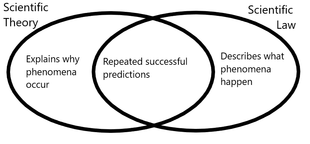What does physical law mean?
Definitions for physical law
phys·i·cal law
This dictionary definitions page includes all the possible meanings, example usage and translations of the word physical law.
Did you actually mean physical or physically?
Wiktionary
physical lawnoun
A universal statement about both nature and society, based on empirical observations of physical behavior, tested using scientific method.
Wikipedia
physical law
Scientific laws or laws of science are statements, based on repeated experiments or observations, that describe or predict a range of natural phenomena. The term law has diverse usage in many cases (approximate, accurate, broad, or narrow) across all fields of natural science (physics, chemistry, astronomy, geoscience, biology). Laws are developed from data and can be further developed through mathematics; in all cases they are directly or indirectly based on empirical evidence. It is generally understood that they implicitly reflect, though they do not explicitly assert, causal relationships fundamental to reality, and are discovered rather than invented.Scientific laws summarize the results of experiments or observations, usually within a certain range of application. In general, the accuracy of a law does not change when a new theory of the relevant phenomenon is worked out, but rather the scope of the law's application, since the mathematics or statement representing the law does not change. As with other kinds of scientific knowledge, scientific laws do not express absolute certainty, as mathematical theorems or identities do. A scientific law may be contradicted, restricted, or extended by future observations. A law can often be formulated as one or several statements or equations, so that it can predict the outcome of an experiment. Laws differ from hypotheses and postulates, which are proposed during the scientific process before and during validation by experiment and observation. Hypotheses and postulates are not laws, since they have not been verified to the same degree, although they may lead to the formulation of laws. Laws are narrower in scope than scientific theories, which may entail one or several laws. Science distinguishes a law or theory from facts. Calling a law a fact is ambiguous, an overstatement, or an equivocation. The nature of scientific laws has been much discussed in philosophy, but in essence scientific laws are simply empirical conclusions reached by scientific method; they are intended to be neither laden with ontological commitments nor statements of logical absolutes.
Wikidata
Physical law
A physical law or scientific law, according to the Oxford English dictionary, "is a theoretical principle deduced from particular facts, applicable to a defined group or class of phenomena, and expressible by the statement that a particular phenomenon always occurs if certain conditions be present." Physical laws are typically conclusions based on repeated scientific experiments and observations over many years and which have become accepted universally within the scientific community. The production of a summary description of our environment in the form of such laws is a fundamental aim of science. These terms are not used the same way by all authors. The distinction between natural law in the political-legal sense and law of nature or physical law in the scientific sense is a modern one, both concepts being equally derived from physis, the Greek word for nature.
Numerology
Chaldean Numerology
The numerical value of physical law in Chaldean Numerology is: 8
Pythagorean Numerology
The numerical value of physical law in Pythagorean Numerology is: 3
Translations for physical law
From our Multilingual Translation Dictionary
Get even more translations for physical law »
Translation
Find a translation for the physical law definition in other languages:
Select another language:
- - Select -
- 简体中文 (Chinese - Simplified)
- 繁體中文 (Chinese - Traditional)
- Español (Spanish)
- Esperanto (Esperanto)
- 日本語 (Japanese)
- Português (Portuguese)
- Deutsch (German)
- العربية (Arabic)
- Français (French)
- Русский (Russian)
- ಕನ್ನಡ (Kannada)
- 한국어 (Korean)
- עברית (Hebrew)
- Gaeilge (Irish)
- Українська (Ukrainian)
- اردو (Urdu)
- Magyar (Hungarian)
- मानक हिन्दी (Hindi)
- Indonesia (Indonesian)
- Italiano (Italian)
- தமிழ் (Tamil)
- Türkçe (Turkish)
- తెలుగు (Telugu)
- ภาษาไทย (Thai)
- Tiếng Việt (Vietnamese)
- Čeština (Czech)
- Polski (Polish)
- Bahasa Indonesia (Indonesian)
- Românește (Romanian)
- Nederlands (Dutch)
- Ελληνικά (Greek)
- Latinum (Latin)
- Svenska (Swedish)
- Dansk (Danish)
- Suomi (Finnish)
- فارسی (Persian)
- ייִדיש (Yiddish)
- հայերեն (Armenian)
- Norsk (Norwegian)
- English (English)
Word of the Day
Would you like us to send you a FREE new word definition delivered to your inbox daily?
Citation
Use the citation below to add this definition to your bibliography:
Style:MLAChicagoAPA
"physical law." Definitions.net. STANDS4 LLC, 2024. Web. 28 Dec. 2024. <https://www.definitions.net/definition/physical+law>.



Discuss these physical law definitions with the community:
Report Comment
We're doing our best to make sure our content is useful, accurate and safe.
If by any chance you spot an inappropriate comment while navigating through our website please use this form to let us know, and we'll take care of it shortly.
Attachment
You need to be logged in to favorite.
Log In